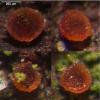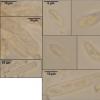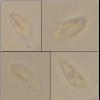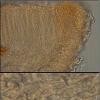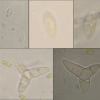
24-02-2026 11:01
Gernot FriebesHi,found on a branch of Tilia, with conidia measur

23-02-2026 11:22
Thomas Læssøehttps://svampe.databasen.org/observations/10584971

29-11-2024 21:47
Yanick BOULANGERBonjourJ'avais un deuxième échantillon moins mat

07-02-2023 22:28
Ethan CrensonHello friends, On Sunday, in the southern part of

19-02-2026 17:49
Salvador Emilio JoseHola buenas tardes!! Necesito ayuda para la ident

19-02-2026 13:50
Margot en Geert VullingsWe found this collection on deciduous wood on 7-2-
Orbilia spec. 1
Gernot Friebes,
29-11-2009 12:48
I found these two Orbilia on a dead, still attached branch of Rosa, ca. 150 cm above the ground.
The first species (the one I show here) has spores of 6-8(9) x 2-3 µm with straight SB which fill 1/2 to 2/3 of the spores. The asci are 8-spored and the paraphses often septate (they look somehow chain-like).
Thanks in advance your help!
Best wishes,
Gernot
Jean-Paul Priou,
29-11-2009 14:02

Re:Orbilia spec. 1
cela devrait aller vers gambelli
jPP
jPP
Hans-Otto Baral,
29-11-2009 15:31

Re:Orbilia spec. 1
Another possibility would be O. trapeziformis. O. gambelii has usually ellipsoid spores and trapeziformis trapezoid, but sometimes the difference is not as clear. A distinct difference is in the SCBs. Could you please make a median section and look in the living excipular cells on flanks and margin? O. gambelii has there rather conspicuous SCBs (angular, usually pale orange) which trapeziformis never has.
O. gambelii is a (sub)mediterranean species. But O. trapeziformis I so far never had on Rosa.
Perhaps you could make more spore photos: Is there sometimes a short tail or at least a more tapered spore base?
Zotto
O. gambelii is a (sub)mediterranean species. But O. trapeziformis I so far never had on Rosa.
Perhaps you could make more spore photos: Is there sometimes a short tail or at least a more tapered spore base?
Zotto
Gernot Friebes,
29-11-2009 18:16
Re:Orbilia spec. 1
Hi,
well, now I know that Orbilia is a really mean genus. I wanted to make a section of an apothecium and suddenly there were different spores - there is a third species on the substrate. I'll show it as Orbilia spec. 3.
Now to O. trapeziformis/gambelii. I think it is trapeziformis because of the form of the spores (there were some with a tail which I, however, could not photograph because they always swam away) and because there weren't any SCBs in the excipular cells.
Best wishes,
Gernot
well, now I know that Orbilia is a really mean genus. I wanted to make a section of an apothecium and suddenly there were different spores - there is a third species on the substrate. I'll show it as Orbilia spec. 3.
Now to O. trapeziformis/gambelii. I think it is trapeziformis because of the form of the spores (there were some with a tail which I, however, could not photograph because they always swam away) and because there weren't any SCBs in the excipular cells.
Best wishes,
Gernot
Hans-Otto Baral,
29-11-2009 20:37

Re:Orbilia spec. 1
Splendid! These star-shaped Trinacrium-conidia belong to Orbilia, and well possibly to this trapeziformis, but they could belong also to another one, though surely not to clavuliformis and septispora. Who knows how many you will further detect :-)
Zotto
Zotto

